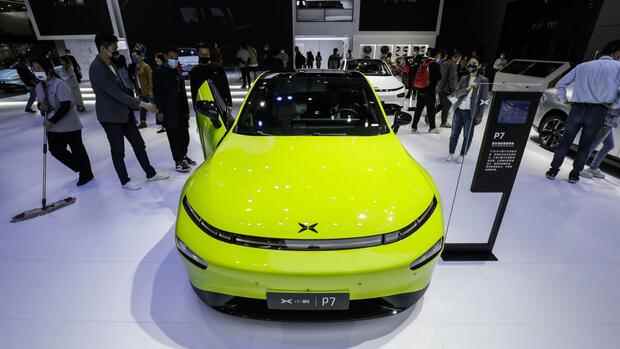The sedan is currently still the flagship of the Chinese.
Dusseldorf A week ago, Xpeng made the car industry sit up and take notice with a world record. The S4 charging station, which the Chinese manufacturer unveiled in Guangzhou, can charge electric cars with an output of up to 480 kilowatts (kW). Five minutes is enough to charge the battery with enough electricity for 210 kilometers, the Chinese rejoiced. Tesla and Porsche are less able to do that.
Sales will “go through the roof,” said founder He Xiaopeng. After all, so far only the XPeng G9 can handle such a charging capacity.
Tesla and Porsche – Xiaopeng sees himself and the company he founded in the same league. Only a few days later, the optimism seems to have evaporated: After the publication of new quarterly figures in the USA, the Xpeng share fell by almost eleven percent on Tuesday – to an all-time low.
Disastrous forecast for deliveries
Top jobs of the day
Find the best jobs now and
be notified by email.
With a turnover of 1.08 billion euros, Xpeng exceeded the expectations of the analysts. “The real problem is the guidance for third-quarter deliveries,” said Barclays analyst Jiong Shao. Since Xpeng wants to deliver 29,000 to 31,000 vehicles – 40 percent less than originally targeted.
And XPeng also suffered a setback in terms of gross profit margin. At 10.9 percent, it was significantly lower. A year ago, it was a full percentage point higher, and even 1.3 percentage points in the previous quarter. This is due to higher investments and discounts.
>> Read about this: These eight Chinese cars are coming to Germany soon
It is a bitter disappointment for the start-up, which, like the US newcomer Lucid, sees itself as a Tesla hunter. Both companies rely heavily on innovation and want to set new standards in production and software like the big role model. But both have disappointed in these weeks with weak production figures, deliveries and price slumps.
Possible trouble with suppliers
A few weeks ago, Lucid lowered its production targets for the second time in a row and only wants to produce a maximum of 7,000 vehicles in 2022 – in May the company had calculated with twice as many cars. As with Xpeng, the stock subsequently plummeted and is currently at an all-time low.
The car executive continues to have high hopes for the Lucid Air.
(Photo: Reuters)
CEO Peter Rawlinson looked for reasons in front of investors, spoke of “extraordinary challenges in the supply chains and logistics”. Lucid’s problem doesn’t seem to be ramping up production in Arizona. To do this, the start-up hired the experienced manager Peter Hochholdinger, who had already freed Tesla from “production hell”.
Instead, the problems appear to be with supplier relationships. According to information from industry circles, the Lucid management is said to have messed with a battery supplier, which is causing procurement problems.
The start-up gets its batteries from the Korean providers LG Energy Solution and Samsung. But the demand for electric cars is currently so high that the providers can choose which customers are supplied first.
>> Read also: This is how China’s BYD launches its attack on the European car market
While Lucid is having trouble processing pre-orders for the premiere Lucid Air model, Chinese competitor Xpeng seems to be lacking demand. In front of analysts, senior manager Brian Gu justified the stagnant sales figures in the second quarter with a “relatively weak season” and the few visitors to Xpeng stores due to the corona lockdowns in China. But other manufacturers like BYD managed to increase their sales even in a weak environment.
Gu therefore places hopes above all on the upcoming model offensive. In October, the start-up will deliver its new SUV G9, of which Xpeng wants to sell more in 2023 than the previous flagship, the P7 sedan.
More: Electric challenger Lucid comes to Germany – despite numerous problems
